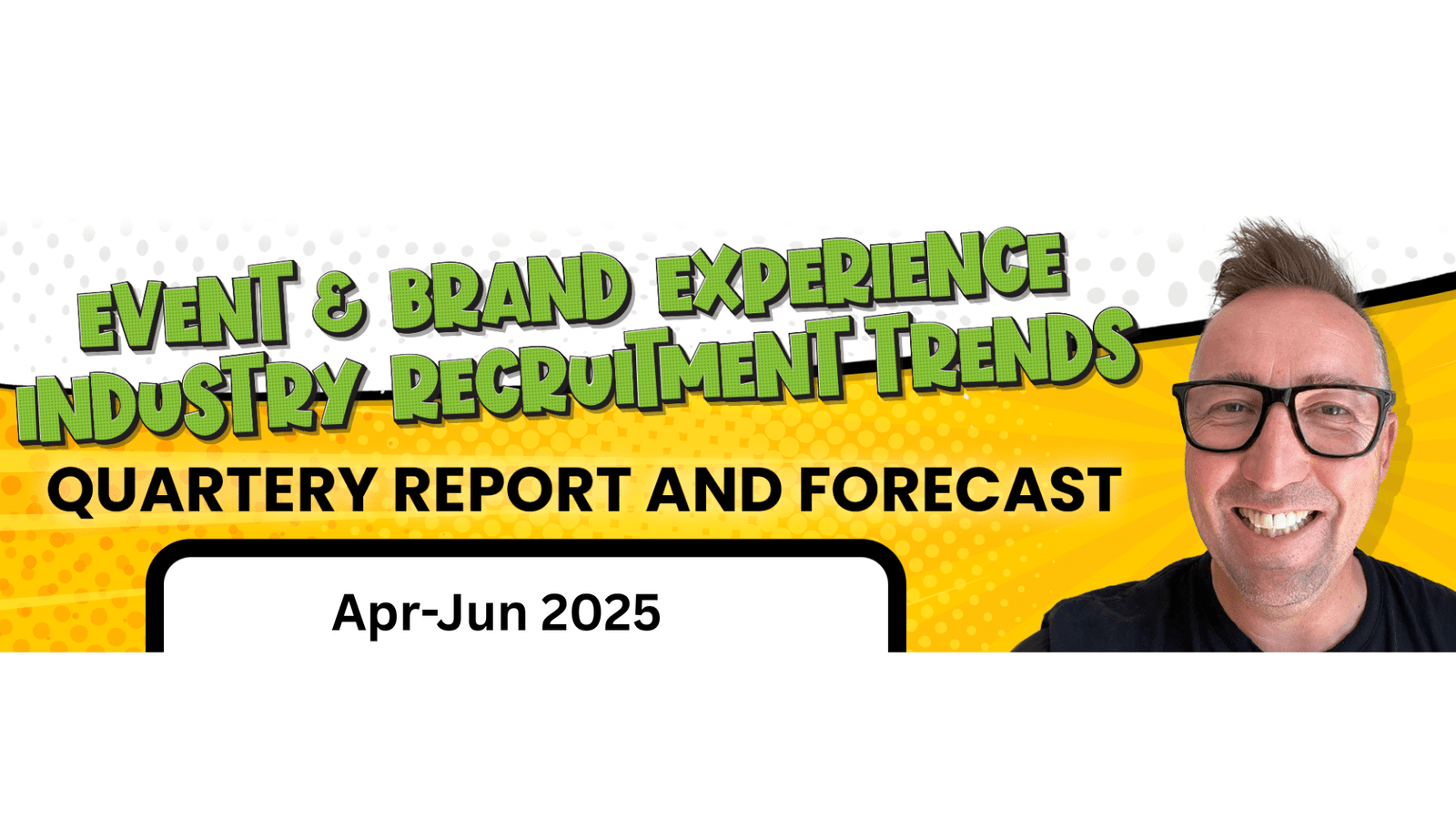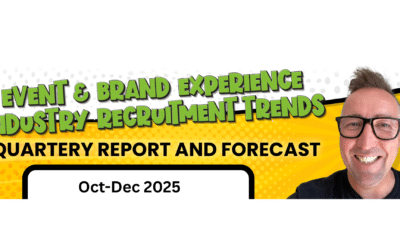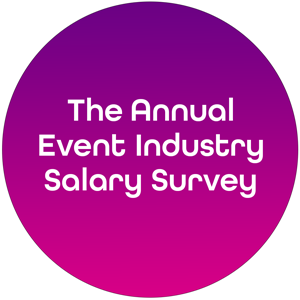As a senior recruitment specialist, I’ve had countless conversations this quarter with agency leaders, hiring managers, C-suite stakeholders, and senior job seekers. What I’m seeing in the events and experiential world is a recruitment market balancing on the edge, evolving fast, but also fatigued. From AI burnout to brand-damaging interview behaviour, a sales talent drought, and the return of face-to-face trust, here’s what stood out in Q2, and what I think is coming next.
Q2 Trends
Trend 1: AI Overload Is Breaking the System
We’ve hit peak AI and recruitment is buckling under the weight of automation. I’ve seen everything from AI-generated job posts to avatars conducting interviews. I’ve even heard of candidates feeding ChatGPT answers in real time while they stare blankly at the screen as their AI avatar fronts the interview. It’s madness. Some companies are even making candidates wave at the camera to prove they’re human.
LinkedIn’s already reacting, AI posts, comments, and scheduled engagement are turning into a pointless content loop. I still believe AI has its place, automating admin and taking down tasks, for example but right now, recruitment is drowning in it. Human connection matters more than ever.
Trend 2: Meetings Are Back
Face-to-face is having a proper renaissance. With digital trust wearing thin (cheers, deepfakes), senior leaders are jumping back on trains and planes to build relationships and get deals done. People want to look someone in the eye. I’ve seen this especially in the meeting space, not necessarily big events. In-person is becoming a signal of trust, which is why candidates with B2B or corporate event experience are in hot demand.
Trend 3: Confidence Is Flat, Not the Market
Q2 is typically a quieter time for senior recruitment, but this year it’s been busier than expected. That said, confidence is still lagging. Nobody’s popping corks, but nobody’s panicking either. The mood is cautious. One day I’m helping someone buy a £10m agency, the next I’m working on redundancy plans. It really is that third/third/third split, some stellar, some surviving, some struggling.
Trend 4: The Middle East Is Up, The US Is Down
The Middle East is still booming as a global events hub, while the US is battling low confidence and demand. Right now, the US feels increasingly uninviting both politically, economically, and culturally. Meanwhile, the Middle East is a magnet for big budgets and bold briefs. What’s changed is the recruitment approach. It’s gone from local hiring to actively bringing in fresh, outside ideas. And let’s be honest, salaries, sunshine, and a high standard of living don’t hurt either.
Trend 5: Sales Talent is Gold Dust
Salespeople are back on the wishlist but no one wants to say it out loud. I hear a lot of “let me know if you find someone,” but no one sends a formal brief until that “someone” appears. And when a high-performing pro hits the market? Suddenly, there’s a six-figure budget waiting.
There’s a huge difference between chasing shiny “opportunities” and delivering strategic growth. Bringing in £6m in ‘opportunities’ isn’t the same as converting £2m in actual new business. Let’s stop pretending it is. If you want top-tier sales talent, you won’t find them sitting on job boards. You need someone who knows where they are.
Trend 6: Interview Processes Are Undermining Your Brand
Some agencies are trying to tighten up their hiring processes, but some are overdoing it. I’ve seen interviewers turn up late, cancel at the last minute, even ghost candidates entirely. Every interaction shapes your brand. In this market, talent won’t put up with being messed around. Candidates are interviewing you, too. When they feel disrespected, they walk.
Trend 7: Jobseekers Are Asking Smarter Questions
Salary still matters, but it’s no longer the first or only question. I’m seeing candidates open conversations asking about pensions, bonus structures, private healthcare, flexible hours. They’re thinking holistically.
Wellbeing, hybrid work, and a strong retention culture are now just table stakes. If you’re still pushing flexible working as your big selling point, you’ve missed the boat and you’re going to miss the best talent too.
Trend 8: EDI Isn’t Dead – But It’s Gone Quiet
Some employers seem relieved that EDI isn’t dominating headlines anymore. I’ve seen the performative stuff, companies posting the same Black History Month square every year and thinking the job’s done.
But candidates are still watching. Diversity and equity matter in how people assess workplaces. Just because it’s not trending doesn’t mean it’s not influencing decisions. People are demanding real action and not more pledges, not surveys, and definitely not another shiny social post. They want proof. If you’re serious about this space, take a look at the REACH Scholarship as it’s making a real difference.
Trend 9: The Rise of Communities (But Don’t Just Lurk)
Industry communities like FastForward15, Delegate Wranglers, Opps Nest, and CN Agency 100 are where real community magic is happening. These aren’t job boards. These are trusted networks that create connection, advocacy, and visibility in ways big platforms can’t.
But here’s the deal, you can’t just show up when you’ve got a vacancy. If your name only appears when you’re hiring, people tune you out. You’ve got to participate, support others, and be present consistently. In a crowded, sceptical market, trust lives in communities and you have to earn it.
Forecasts for 2025
Retention Will Define the Winners
The businesses that keep their people are the ones that will evolve. Retention means recognising that the world has changed and not trying to reverse it. You can’t run a modern company with a 1998 playbook. If someone’s struggling with their mental health, you don’t roll your eyes, you equip your managers to support them.
Attrition matters too. I’ve seen people leave in year one because the job they were sold didn’t materialise. Hiring right is hard. Losing people through poor onboarding or broken promises is criminal.
Work-Life Blend
Six-hour days, four-day weeks, flexible work, this isn’t about slacking off. It’s about managing energy, not time. I don’t work Mondays. But I might do a couple of hours each evening or on a Sunday afternoon. That works for me. Others need full switch-off time. The point is it’s personal, and it has to fit around real life.
Managers Need Training – Not Just Pressure
Work isn’t a crèche but it’s not a bootcamp either. You can’t expect leaders to manage modern challenges if you don’t give them tools. Retention doesn’t happen through vibes. It comes from trained, empathetic, practical leadership. I’m finally seeing businesses wake up to this and invest in their managers. It’s long overdue.
The World Has Changed. Move With It.
Look, I get it. It’s tempting to grumble about Gen Z or long for the ‘good old days’. But that’s just noise. If you don’t adapt, you’ll lose people. Maybe not tomorrow but soon. I’m more experienced myself, and yes, I’ve had to bite my tongue sometimes. But this is where we are. You can swim with the tide or be pulled under.
In short:
Recruitment in this sector is evolving fast and I’m genuinely excited to be part of it. I feel lucky to have a front-row seat.






